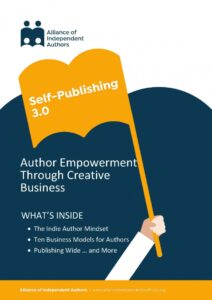Today’s authors can be creative business owners building independent publishing enterprises based on intellectual property (IP). Yet many independent authors forgo their independence, and compromise the value of their IP, by signing or assigning their books exclusively to another business without due diligence. Orna Ross explores the important principle of publishing inclusivity for authors and the dangers of going exclusive with one publisher or one self-publishing service. For more, see ALLi’s Self-Publishing 3.0 campaign and guide.
 Self-Publishing 3.0 is a concept and a publishing era defined by the concept: that any author (with the requisite skills) now has the means to establish a sustainable and scalable business. It is also a campaign from the Alliance of Independent Authors (#selfpub3.0) that works with authors, readers, literary organizations, and creative industries to support independent authors in acquiring the three necessary skills: writing, publishing and creative business.
Self-Publishing 3.0 is a concept and a publishing era defined by the concept: that any author (with the requisite skills) now has the means to establish a sustainable and scalable business. It is also a campaign from the Alliance of Independent Authors (#selfpub3.0) that works with authors, readers, literary organizations, and creative industries to support independent authors in acquiring the three necessary skills: writing, publishing and creative business.
In the past, authors depended for success on influencers and gatekeepers: publishers, agents, librarians, booksellers, professional critics, and reviewers. That system is still in place, though shrinking in size. Today’s indie author depends on attracting, engaging, and delighting readers through a variety of platforms and formats and high-level publishing skills. That system is expanding in size and influence, not least on social media.
In author circles, we pay a lot of attention to the larger payments a self-publishing author receives and cite it as a primary reason to self-publish. Less discussed, but actually more significant across the long term is how self-publishing allows authors to publish without having to exclusively license their intellectual property (IP).
As a self-publisher, an author retains all rights, which can be strategically assigned. Each format of a book–print, ebook, audiobook, TV program, film, translation, and more–can be selectively licensed to a different entity, and appropriately recompensed, within a comprehensive publishing strategy.
Self-Publishing 3.0 allows for the principle of publishing inclusivity: publishing through as wide a variety of outlets, formats and territories as possible, for maximum visibility and discoverability.
This has enormous value, over time.
READ THE FULL ARTICLE HERE ON THE ALLIANCE OF INDEPENDENT AUTHORS
Self-Publishing 3.0 Campaign




